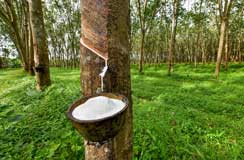 Faced with a debilitating leaf fall disease affecting the rubber sector, the Philippine Rubber Research Institute (PRRI) is formulating strategies and forging collaborations to tackle Pestalotiopsis Leaf Fall Disease (PLFD) while simultaneously enhancing the rubber industry in the country.
Faced with a debilitating leaf fall disease affecting the rubber sector, the Philippine Rubber Research Institute (PRRI) is formulating strategies and forging collaborations to tackle Pestalotiopsis Leaf Fall Disease (PLFD) while simultaneously enhancing the rubber industry in the country.
The PRRI said it would develop an action plan aimed at increasing rubber production and enhancing the livelihood of smallholder farmers.
PRRI Director Cheryl Eusala also stressed the importance of controlling the spread of PLFD as this poses a significant threat to the rubber industry.
She urged other local government units (LGUs) in Region IX “to create an executive order” aimed at banning the movement of rubber planting materials to contain the spread of the disease and protect rubber plantations from further damage.
The PRRI said it fully supports Zamboanga Sibugay’s recent executive order, which temporarily bans the movement of rubber plant parts and planting materials within the province.
Zamboanga’s rubber industry is seriously threatened by PLFD, putting the rubber plantation of the province at risk.
When infected planting materials are moved, the disease may spread rapidly, threatening the industry as a whole.
The PRRI also aims to forge partnerships with the Department of Environment and Natural Resources (DENR) and Department of Science and Technology (DOST) regarding the processing of rubberwoods into furniture.
“By working together, these organisations will explore opportunities for the utilization of senile rubber trees, thereby contributing to sustainable practices in the industry,” it said.
Meanwhile, Zamboanga City Special Economic Zone Authority and Freeport chairman Raul Regondola urged the PRRI to conduct an assessment and pest surveillance in the ecozone area, specifically profiling Lapacan which is recognised as the largest supplier of rubber to CTK Asia Rubber Corp.
With the emphasis on reliable data, the Regional Development Council (RDC) expressed its support for PRRI’s profiling activities, enabling PRRI to gather accurate and comprehensive information, leading to informed decision-making and targeted interventions.
While the DENR announced its decision to discontinue the distribution of planting materials, it will conduct an inventory of rubber data and assess PLFD’s impact on rubber areas to provide valuable insights into the disease’s prevalence and guide future interventions.
Moreover, DENR expressed its commitment to supporting rubber farmers by ensuring fair pricing and facilitating market access for their products to help improve the economic conditions of smallholder rubber farmers and contribute to their overall well-being.
